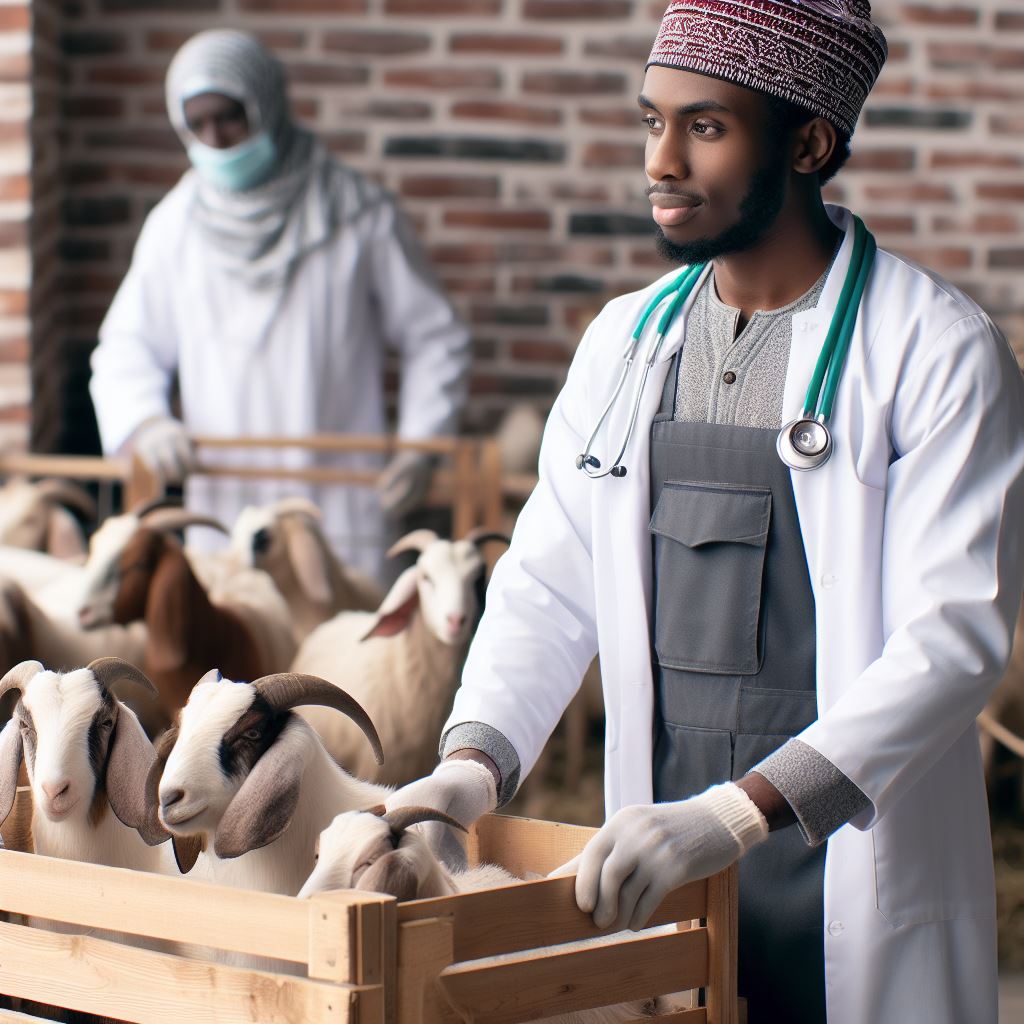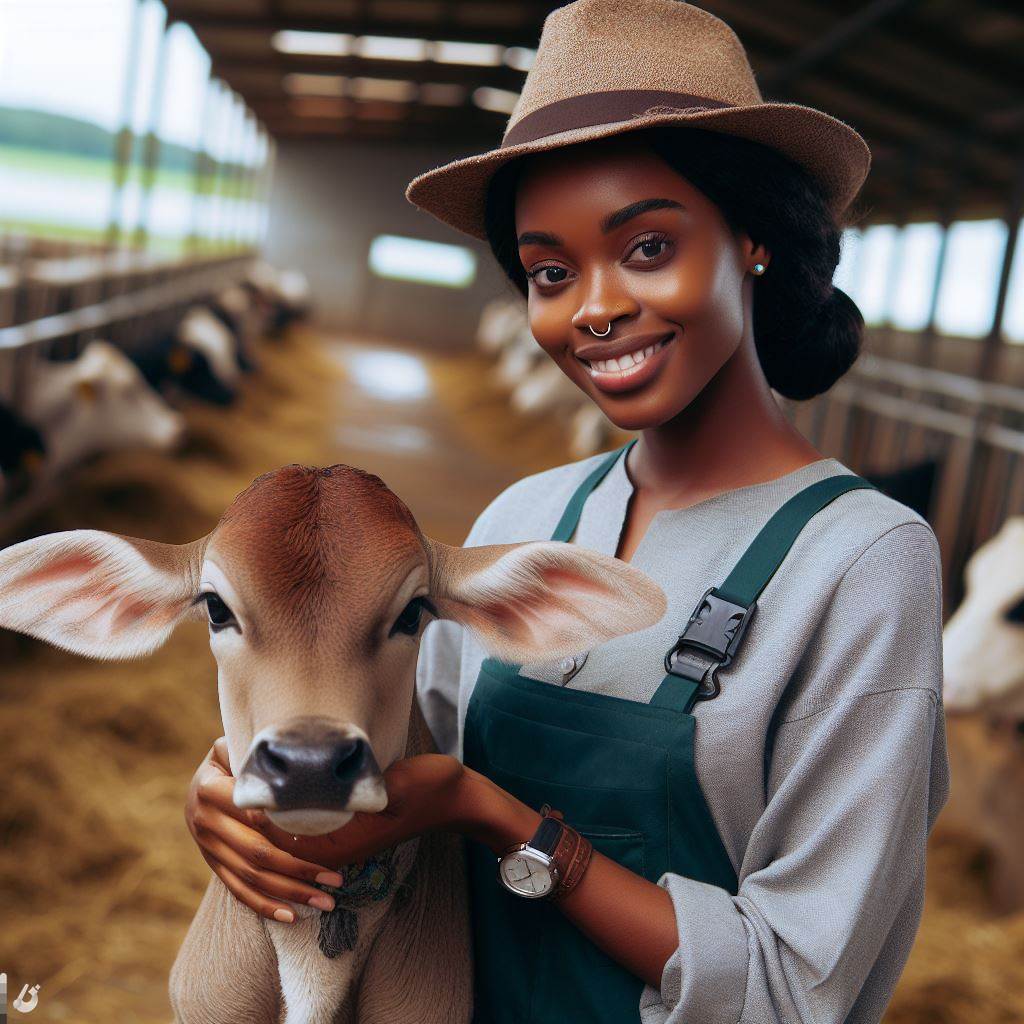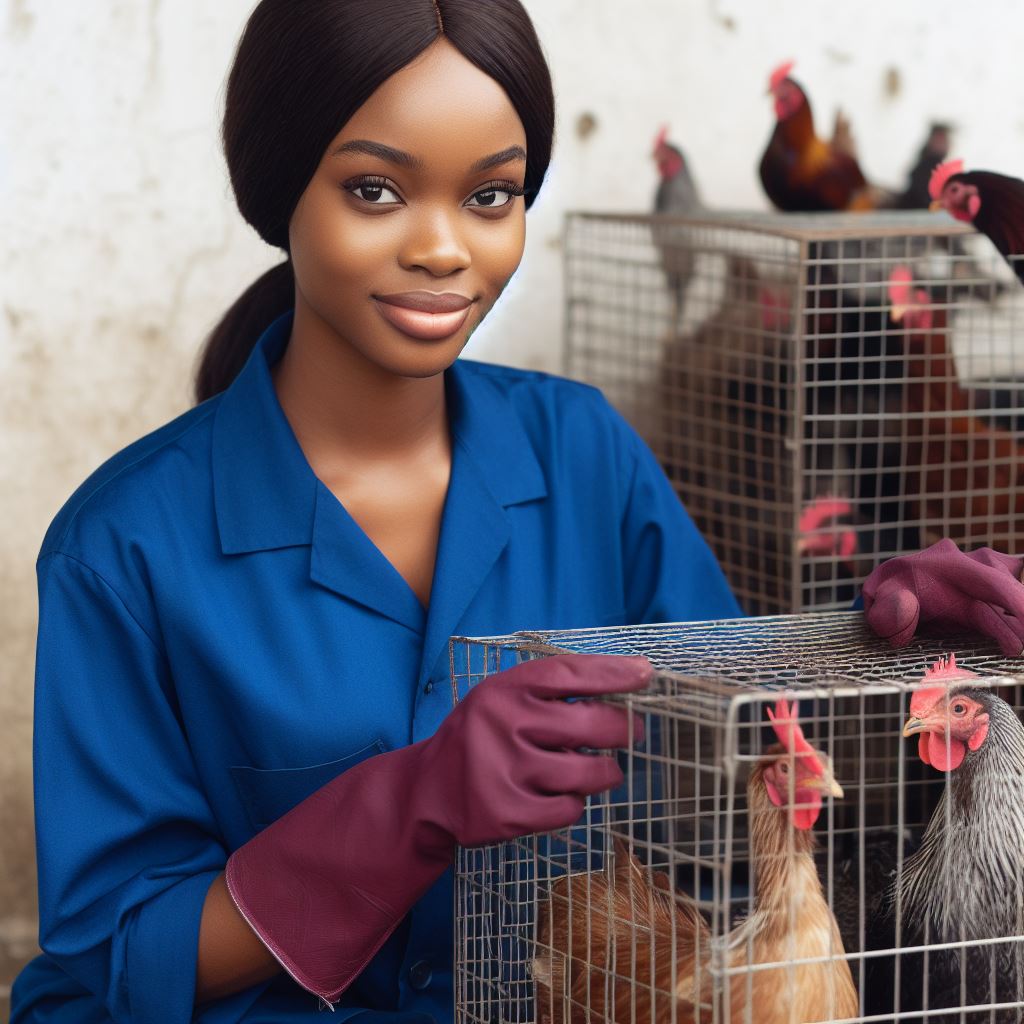Introduction
This blog post will explore Student Experiences in Animal Breeding in Nigerian Schools.
In Nigerian schools, the pursuit of animal breeding echoes the nation’s agrarian essence.
This focus within educational institutions stands as a crucial pillar nurturing agricultural prowess.
The importance of animal breeding resonates deeply within Nigeria’s agricultural industry.
It serves as the cornerstone for sustainable livestock development, ensuring robust yields.
Nigeria, with its vast agricultural potential, relies significantly on livestock farming.
Animal breeding, thus, emerges as a linchpin skill vital for enhancing productivity.
Its integration into school curricula cultivates a profound understanding among students.
This understanding encompasses breeding techniques, genetics, and livestock management practices.
Equipping students with these skills holds paramount importance in Nigeria’s context.
It empowers the next generation to contribute substantially to the nation’s agricultural economy.
Furthermore, animal breeding education fosters innovative approaches to livestock rearing.
It encourages the application of modern technologies for enhanced breeding outcomes.
Nigeria’s agricultural landscape constantly evolves, demanding adeptness in breeding practices.
By integrating animal breeding into the educational framework, schools nurture future agricultural leaders.
These individuals will spearhead advancements in livestock production, crucial for Nigeria’s food security.
Additionally, the inclusion of animal breeding courses ignites interest and passion among students.
It opens avenues for career prospects within the agricultural sector.
Moreover, understanding animal breeding intricacies aligns with global sustainability goals.
Efficient breeding practices mitigate environmental impacts and promote biodiversity conservation.
As Nigerian schools embrace this educational facet, they pave the way for holistic agricultural development.
The symbiotic relationship between education and agriculture underscores the nation’s progress.
Thus, introducing animal breeding in Nigerian schools signifies an investment in a sustainable agricultural future.
Overview of animal breeding programs
Availability of animal breeding programs in Nigerian schools
Nigeria is home to various animal breeding programs that cater to students interested in pursuing a career in this field.
These programs are offered at different levels of education, ensuring that individuals can gain expertise in animal breeding regardless of their educational background.
Different levels of education offering these programs
At the undergraduate level, Nigerian schools offer animal breeding programs as part of agriculture and veterinary science curricula.
These programs are designed to provide students with a strong foundation in the principles and practices of animal breeding.
Students learn about genetics, reproduction techniques, and selection criteria to improve livestock productivity.
Postgraduate students can specialize in animal breeding by pursuing advanced degrees such as Master’s or Ph.D. programs.
These programs delve deeper into topics related to animal genetics, breeding techniques, and genetic improvement strategies.
Postgraduate students have the opportunity to conduct research and contribute to the field’s knowledge and advancements.
Universities or institutions that are known for their animal breeding programs
Several universities and institutions in Nigeria are renowned for their animal breeding programs.
One such institution is Ahmadu Bello University, which offers undergraduate and postgraduate programs in animal breeding within its Faculty of Agriculture.
The university boasts state-of-the-art facilities and a team of experienced faculty members who mentor the students.
Another notable university is the University of Ibadan, known for its strong foundation in agricultural sciences.
The Department of Animal Science offers courses and programs in animal breeding, attracting students from all over Nigeria who wish to specialize in this field.
The department’s faculty members are actively involved in research and consultancy, further enhancing the students’ learning experience.
Aside from these universities, several institutions and research centers in Nigeria also focus on animal breeding programs.
The National Animal Production Research Institute (NAPRI), located in Shika, Zaria, is dedicated to research and development in animal production, breeding, and genetics.
The institute collaborates with universities and colleges to offer training programs and conduct research projects.
Transform Your Career with Expert Guidance
Get personalized mentorship consulting that’s tailored to your unique path. Our expert advice is actionable and exclusive.
Get StartedIn essence, animal breeding programs are readily available in Nigerian schools.
These programs cater to students at various levels of education, including undergraduate and postgraduate.
Ahmadu Bello University and the University of Ibadan are recognized for their excellent animal breeding programs, while the National Animal Production Research Institute plays a crucial role in advancing research and development in this field.
Students interested in animal breeding can pursue their passion and acquire the necessary knowledge and skills through these programs.
Read: Comparing Nigerian Animal Breeding Programs with Global Standards
Entry requirements and admission process
General entry requirements for pursuing animal breeding in Nigerian schools
General entry requirements for pursuing animal breeding in Nigerian schools include a high school diploma or its equivalent.
Prospective students must have completed their secondary education with good grades in relevant subjects such as biology, chemistry, and mathematics.
Some universities may also require applicants to have a certain minimum score in standardized tests like JAMB (Joint Admissions and Matriculation Board).
Specific admission process, including entrance exams or interviews
The admission process typically involves submitting an application form, academic transcripts, and other required documents.
Universities may also conduct entrance exams or interviews to assess the knowledge and suitability of the applicants.
Entrance exams may evaluate candidates’ understanding of biology, chemistry, and other related subjects.
Interviews generally aim to assess candidates’ passion for animal breeding and their motivation to pursue a career in the field.
Tips for prospective students on how to increase their chances of being accepted into these programs
- Prospective students can increase their chances of being accepted into these programs by maintaining good academic standing throughout their high school education.
- Participating in extracurricular activities related to animal breeding, such as joining a local animal breeding association, can demonstrate a student’s commitment and passion.
- It is also recommended for prospective students to gain practical experience in animal breeding, such as volunteering at local farms or veterinary clinics.
- Writing a compelling personal statement that reflects their interest, knowledge, and future goals in animal breeding can greatly enhance their chances of acceptance.
- Obtaining strong letters of recommendation from teachers, mentors, or professionals in the field can provide additional support to their application.
- It is essential for prospective students to thoroughly research the admission requirements and processes of different universities offering animal breeding programs.
- Understanding the specific prerequisites and criteria of each institution can help students tailor their preparation and increase their chances of acceptance.
- Prospective students should also consider reaching out to current students or alumni of animal breeding programs to gain insights and advice.
By following these tips and fulfilling the entry requirements, prospective students can maximize their chances of being accepted into animal breeding programs in Nigerian schools.
Read: Innovations in Animal Genetics Research: Spotlight on Nigeria
Curriculum and courses
When pursuing animal breeding in Nigerian schools, students can expect to encounter a comprehensive curriculum that covers various aspects of the field.
The coursework encompasses both theoretical and practical components, ensuring a well-rounded education.
Typical curriculum and courses covered in animal breeding programs
The typical curriculum for animal breeding programs includes foundational courses in biology, genetics, and animal science.
These courses establish a strong knowledge base for students to understand the principles and techniques involved in animal breeding.
As students progress, they delve deeper into specialized courses that focus specifically on animal breeding.
These courses include advanced genetics, reproductive physiology, quantitative genetics, and breeding strategies.
The theoretical and practical aspects of the coursework
The theoretical aspect of the coursework involves studying the principles and underlying theories related to animal genetics and breeding.
Students learn about genetic selection methods, heritability, genotype-environment interaction, and genetic improvement of animals.
Practical aspects are equally emphasized to provide hands-on experience.
Students have the opportunity to work with farm animals, observe breeding techniques, and participate in breeding programs.
They gain practical skills in animal handling, record-keeping, and selection of breeding stock.
Elective courses that students can choose from.
In addition to the core curriculum, students can choose from a range of elective courses to specialize further in their area of interest.
Specializations may include topics such as dairy cattle breeding, poultry breeding, swine breeding, or aquaculture breeding.
These elective courses allow students to tailor their education towards their specific career goals.
Fieldwork and internships are also integrated into the curriculum.
Students have the chance to gain real-world experience by working with established animal breeding programs, research institutions, or agricultural farms.
This provides valuable exposure and fosters the application of theoretical knowledge in practical settings.
Furthermore, students often engage in research projects in collaboration with faculty members.
These projects enable them to contribute to the field of animal breeding through data collection, analysis, and interpretation.
Research experiences empower students to develop critical-thinking skills and to make unique contributions to the advancement of animal breeding practices in Nigeria.
Overall, the curriculum and courses in animal breeding programs in Nigerian schools encompass a wide range of theoretical knowledge and practical skills.
Students are provided with a strong foundation in genetics and animal science and are equipped with specialized knowledge in various aspects of animal breeding.
The opportunity to choose elective courses and engage in internships further enhances their learning experience and prepares them for successful careers in animal breeding.
Facilities and resources
Student experiences in animal breeding in Nigerian schools often involve caring for various livestock species.
The facilities and resources available to animal breeding students in Nigerian schools
Facilities and resources available to animal breeding students in Nigerian schools include:
- Research Laboratories: Nigerian schools provide well-equipped research laboratories for students to conduct experiments and analyze data.
- Farms: These schools have their own farms where students can gain practical experience by working with different animal breeds.
- Technologies: Advanced technologies such as artificial insemination and embryo transfer are used for hands-on learning in animal breeding programs.
Collaborations that schools have with industries related to animal breeding
- Partnerships and Collaborations: Nigerian schools often collaborate with industries related to animal breeding, such as veterinary clinics, livestock farms, and genetic research institutions.
- Industry Internships: Students have the opportunity to intern at these partner industries to further enhance their practical skills.
- Expertise and Guidance: Nigerian schools employ experienced faculty members who provide guidance and expertise to students throughout their academic journey.
- Access to Genetic Resources: Schools have partnerships with breeding centers and organizations to grant students access to valuable genetic resources for their research and practical work.
- Library Resources: Extensive collections of books, journals, and online resources are available to students for studying and academic research in animal breeding.
- Extracurricular Activities: Nigerian schools organize workshops, seminars, and conferences related to animal breeding to enhance students’ knowledge and networking.
- International Collaborations: Some schools have international collaborations and partnerships, allowing students to access global expertise and research opportunities in animal breeding.
Read: Student Reviews: Pursuing Animal Physiology in Nigerian Universities

Student Experiences: Pursuing Animal Breeding in Nigerian Schools
The hands-on approach to student experiences in animal breeding in Nigerian schools fosters practical skills and knowledge.
Insights from Current and Past Students
James, a recent graduate, shared his experience pursuing animal breeding at a Nigerian school.
He mentioned that the curriculum provided a strong foundation in animal husbandry and breeding techniques.
Jennifer, a current student, expressed her passion for animal breeding and how it sparked during her time in school.
She highlighted the practical hands-on training that allowed her to develop essential skills in the field.
David, another graduate, spoke about the comprehensive learning environment and excellent faculty support.
Challenges and Overcoming Them
Many students faced financial constraints, making it challenging to afford the necessary textbooks and resources.
However, they overcame this hurdle by forming study groups and sharing materials, ensuring everyone had access to the required knowledge.
Some students struggled with the practical aspects of animal breeding, as it required patience and attention to detail.
To overcome this challenge, they sought help from professors and experienced breeders, who provided valuable guidance.
Language barriers posed another difficulty, especially for international students.
They tackled this issue by actively participating in language classes and engaging in conversations with native speakers.
Personal Stories and Anecdotes
One memorable anecdote is from Fatima, who recounted her experience with successfully breeding rare Nigerian dwarf goats.
She mentioned the initial struggles she faced, from sourcing proper mating pairs to ensuring the doe’s safe pregnancy.
However, her dedication paid off when she welcomed a healthy litter of adorable kids, marking a significant achievement in her breeding journey.
Another inspiring story comes from Ahmed, who specialized in breeding chickens for improved egg production.
He shared how one of his innovative techniques for enhancing fertility rates received recognition at a national agriculture conference.
Ahmed’s passion and hard work not only helped him excel academically but also opened doors for future research collaboration.
Rewards and Benefits
Students who pursued animal breeding in Nigerian schools gained a deep understanding of genetics and animal reproduction.
They developed critical thinking skills by identifying and solving real-world breeding challenges.
Graduates of animal breeding programs found fulfilling careers in government agencies, research institutions, and private farms.
Moreover, they contributed to sustainable livestock production, ensuring food security in Nigeria.
The field of animal breeding also provided opportunities for international collaborations and advancements in the agricultural sector.
In fact, pursuing animal breeding in Nigerian schools offers students a wealth of knowledge and practical skills.
Despite facing challenges, such as financial constraints and language barriers, students persevere and overcome them with support from peers and faculty.
Personal stories and anecdotes highlight the rewards and benefits, including academic achievements, career opportunities, and contributions to the agricultural industry.
Overall, choosing animal breeding as a field of study in Nigerian schools can lead to a fulfilling and impactful career.
Read: Renowned Animal Physiologists from Nigeria and Their Contributions
Find Out More: Career Opportunities in Plant Breeding in Nigeria
Delve into the Subject: Digital Platforms for Livestock Market in Nigeria
Career Prospects and Opportunities
Student experiences animal breeding in Nigerian schools vary based on the available resources and curriculum.
Career Prospects for Animal Breeding Graduates in Nigeria
Animal breeding is an emerging field in Nigeria that offers promising career prospects for graduates.
With a growing interest in animal breeding and genetics, there is an increasing demand for professionals with expertise in this field.
Nigerian universities and agricultural institutes offer specialized programs in animal breeding, equipping students with the necessary knowledge and skills to excel in their careers.
Graduates can find employment opportunities in various sectors, including livestock production, research institutions, and government agencies.
Demand for Professionals in This Field and Potential Job Opportunities
The demand for professionals in animal breeding is on the rise due to several factors.
Firstly, Nigeria has a large agricultural sector, and improving livestock genetics is critical for enhancing productivity and profitability.
As a result, there is a need for skilled animal breeders to implement effective breeding programs.
Furthermore, the government has recognized the importance of animal breeding in sustainable agriculture and food security.
This has led to increased investment in research and development, creating more job opportunities for animal breeding graduates in both public and private sectors.
Some potential job opportunities for animal breeding graduates include:
- Animal Geneticist: Animal geneticists study and analyze genetic data to improve breeding programs and develop strategies for genetic improvement.
- Livestock Consultant: Livestock consultants provide expert advice to farmers and livestock producers on breeding techniques, genetic selection, and herd management practices.
- Research Scientist: Research scientists in animal breeding conduct studies and experiments to advance the understanding of animal genetics and develop new breeding strategies.
- Breed Association Specialist: Breed association specialists work closely with livestock breeders and breed associations to maintain breed standards, register animals, and promote genetic improvement.
Success Stories or Notable Alumni Who Have Excelled in Animal Breeding Careers
Several success stories and notable alumni have emerged from the animal breeding field in Nigeria.
These individuals have made significant contributions to the field and serve as inspiration for aspiring animal breeders.
One such success story is Dr. Oyeyemi Ajayi, a renowned animal geneticist who has played a pivotal role in advancing animal breeding research in Nigeria.
His groundbreaking work on improving the genetic potential of indigenous livestock breeds has received international recognition.
Another notable alumnus is Dr. Adebayo Majeed, who is now a professor of animal breeding at a prestigious Nigerian university.
Dr. Majeed’s research focuses on developing sustainable breeding programs for small-scale farmers, aiming to enhance livestock productivity and reduce poverty.
These success stories highlight the immense opportunities and potential for growth in animal breeding careers in Nigeria.
As the field continues to evolve and gain importance, more talented individuals are expected to make significant contributions to the sector.
In short, pursuing a career in animal breeding in Nigerian schools offers promising prospects and opportunities.
Graduates can explore various job roles in livestock production, research, and consultancy.
The demand for professionals in this field is increasing, driven by the need for improved livestock genetics and sustainable agricultural practices.
Success stories and notable alumni further inspire students to excel in animal breeding, contributing to the development of the field in Nigeria.
Gain More Insights: Funding Opportunities for Pasture Management Projects in Nigeria
Conclusion
In this blog post, we have discussed the student experiences of pursuing animal breeding in Nigerian schools.
We have highlighted the challenges faced by students as well as the opportunities available in this field.
It is important to encourage interested individuals to consider pursuing animal breeding in Nigerian schools as it offers a promising career path with a great potential for growth.
Furthermore, supporting and investing in agricultural education in Nigeria is crucial for the development of the country’s agriculture sector and overall economic growth.
By investing in quality education and providing necessary support, Nigeria can create a skilled workforce of animal breeders who can contribute to the sustainable development of the agricultural sector.




